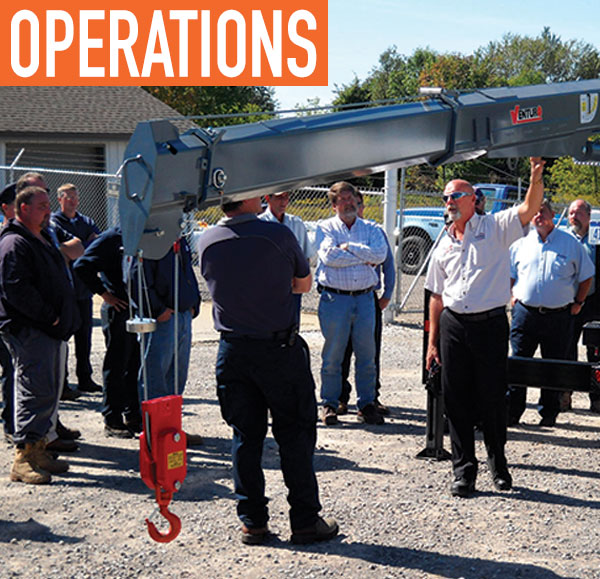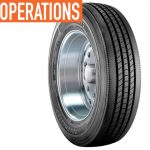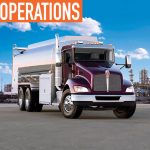New federal Occupational Safety and Health Administration regulations [OSHA 1926.1400] mandate that operators of most large cranes (2,001-lb lifting capacity and up) will need to be certified by an accredited crane operator testing organization for safety and liability purposes. This regulation states that all crane operators that use service truck cranes in a construction function must be “certified” and, when used in a maintenance-type function, must be deemed—at a minimum—a “qualified operator.” The certifications and/or qualifications must be in place by November 10, 2017, [§1926.1427(a)(k)].
WHOM THIS MANDATE CONCERNS
Fleet managers need to certify and/or qualify their service truck operators working with small, truck-mounted cranes used to service construction machines and deliver building materials. Industries include municipalities, propane, oil and gas, fleets, as well as safety directors and owners of mechanics trucks used in construction. Under the OSHA rules, any crane work that holds, supports, stabilizes, stages, sequences, or positions materials or aids or assists in the construction process is considered “in scope” and requires a qualified or certified operator—except when using very specific, exempt crane equipment. For example, any application considered “new construction” will require a qualified or certified operator and must meet specific crane and material requirements.
To achieve certification, the operator must pass a written and a practical exam that is administered by the National Commission for the Certification of Crane Operators (NCCCO) or equal. Certification would also ensure meeting the “qualified” requirement. A company could opt to qualify its employees with an internal training and testing program in cases where certification is not mandated. If the training is not done properly, however, OSHA could cite the company for not having “qualified” operators.
The written NCCCO test covers four areas, including site and set up; operations; technical knowledge of the standards, codes, and equipment requirements; and understanding and interpreting load charts. A certified service truck crane operator then receives credentials verifying the qualifications necessary to run service truck cranes.
It is important to note that states can also set their own regulations regarding certification of crane operators for service trucks that also require compliance. Currently, 17 states have requirements for training, inspections, certifications, and qualifications that may be stricter than the OSHA rules.

PREPARING CRANE OPERATORS FOR CERTIFICATION
Classes are highly recommended to help prepare for the written exam. Most courses vary in length—between two and five day sessions—depending on the subject. Most training also consists of a written exam and a practical operating evaluation. Attendees who meet all of the requirements for qualification at the end of a course receive a certificate and a wallet-size identification card.
Typical options for training programs for fleet and end users may include:
- Crane Operator Training: Qualifies candidates as operators through a three-day class. Includes current OSHA/ASME standards, operator responsibilities, physical criteria, pre-shift inspections, hand signals, load chart definition, and other required standards. Participants will receive a qualification card and a certificate of completion upon passing. Ref: Min. Requirements OSHA 1926.1427 / ASME B30.5 – 5-3.1.1
- Crane Inspector Training: Teaches pre-shift, frequent, and periodic crane inspections, as well as required record keeping in a two-day class. Includes proper wire rope and hook inspections, proper rigging inspections, maintenance intervals, and necessary classroom materials. When completed with passing score, candidate will be able to perform all required crane inspections. Ref: OSHA 1926.1427 / B30.5-2014 5-2
- Train the Trainer: Instructs large companies and fleet-type accounts that have in-house safety directors in a three-day class. These safety directors will, in turn, be able to train their operators in-house to become “Qualified Operators” that follow the Crane Operator Training. Includes materials to administer a practical exam, written quizzes, and final exams.
Typical options for training programs for distributors may include:
- Electric Crane Troubleshooting and Repair: Provides quick ways to troubleshoot problems and offers tricks for easy repairs. Participants will gain a complete understanding of the electrical system, hydraulic system, and all mechanical aspects of the crane.
- Hydraulic Crane Troubleshooting and Repair: Offers similar information to the Electric Crane course, as well as in-depth knowledge of the hydraulic valves, cylinders, and structures.
- Crane and Body Installation: Covers mounting of a specific crane body, along with complete crane and outrigger packages.
- Hoist Installation and Repair: Teaches the proper installation of conversion hoists, along with capacity ratings and troubleshooting/repair.
When selecting a training partner, it’s important to consider a program with trainers who understand the equipment. This will ensure all participants are not only prepared for the written examination, but that they also receive accurate instruction that will be beneficial in running the equipment. Additional hands-on training can be arranged in preparation for the practical operating evaluation.
FOR MORE INFORMATION:
Dave Foster, vice president of manufacturing and engineering for Venco Venturo Industries and the training manager for Venturo Training Services, has more than 40 years of experience in the truck equipment industry. He is a Qualified Crane and Rigging Inspector; a Certified Factory Trainer; a National Commission for the Certification of Crane Operators (NCCCO) TSS Certified Crane Operator; and has a Certificate of Competency under current OSHA and ANSI/ASME codes. Dave provides comprehensive training services and can be reached at 800.226.2238.
_______________________________________________________________________
MODERN WORKTRUCK SOLUTIONS: FEBRUARY 2016 ISSUE
Did you enjoy this article?
Subscribe to the FREE Digital Edition of Modern WorkTruck Solutions magazine.
![]()




